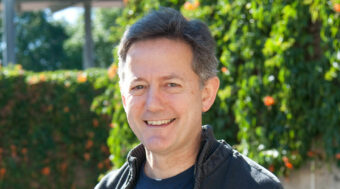
Meet Nick Earls, author of 27 books for adults, teenagers and children. Two of his books have been adapted into feature films, and five into stage plays. His most recent work is the award-winning novella series Wisdom Tree, described in the Sydney Morning Herald as ‘a triumphant and extraordinary piece of fiction’.
If you could put any book in a Street Library, what would it be and why?
Street Libraries are great places to discover writers you’ve never heard of, so I’d be tempted to slip in a book people in my neighbourhood might not have heard of. So, I’m going for Ocean Vuong’s On Earth We’re Briefly Gorgeous. Vuong established a reputation as a poet before publishing this, his first novel, and that poet’s ear for language comes through. It’s a beautifully composed story of a childhood and adolescence that took me into a life I hadn’t seen close up before.
What book(s) are you currently reading, and what sorts of things do you look for in a ‘good book’?
I’m about to read Simon Groth’s Ex Libris. The premise is great. It’s set in a dystopian future where stories are banned, but in which recusants gather fragments of stories together to see if they can make a whole. And what’s truly exciting is that Simon did that with the book. While the beginning and end are fixed, the sections in between are shuffled for each copy, so no two copies are alike.
Ultimately, I want a book that absorbs me, and does it more with character and craft rather than plot.
Have you come across a Street Library, if so where and what was your experience?
I’ve seen quite a few. It’s always intriguing to see what’s been left there. I’ve taken it as a chance to read short stories over coffee. I knew I could take the book, but I quite liked putting it back and seeing if it was still there next time. There’s one near me that works well for that approach (https://streetlibrary.org.au/library/nowhere-community-street-library/).
Street Libraries are all about the sharing and discovering of new stories. Can you remember a time where you experienced such a discovery in your own life? What advice would you give on how to continue to pass on such explorations of literature?
One great moment of discovery was hearing Sheila Heti read some of her micro fiction from The Middle Stories at a writers’ festival in Calgary in 2001. They were tiny and sharply crafted, and I sat there in awe and had to read the book.
But my advice can’t be ‘go to a writers’ festival in Calgary and hope that Sheila turns up’. I think awareness of great books is to be shared. If I find a book I love, I work out what I love about it, and that’s what I try to pass on to people I think might click with the same thing.
What inspired you to become an author?
You get to make stuff up and you get paid for it. Does there need to be anything more to it than that? At one level it’s maybe ridiculously self-indulgent, but I proceed in the hope that, each time, the idea that has compelled me enough to pursue it and turn it into something might also have something about it that will interest some other people too. I try to find the most interesting way I can of delivering it. I keep doing it, after 27 books, because each new one starts out as a puzzle I don’t quite know how to solve yet.
If you could design your own Street Library in any way imaginable, how would it be decorated and why?
I’m clueless about decoration. And visual aesthetics generally. Each morning I put on the next T-shirt in the pile, and I just cut my own hair after six months of no haircuts. I appreciate the at-times idiosyncratic approach others bring to street libraries though. I like the spaces they’ve made for books.
My street library would have good protection against rain and be near a shady spot with good coffee. Actually, it would be in a place where people need and want books, but don’t have great access to them. That and the rain protection thing.
